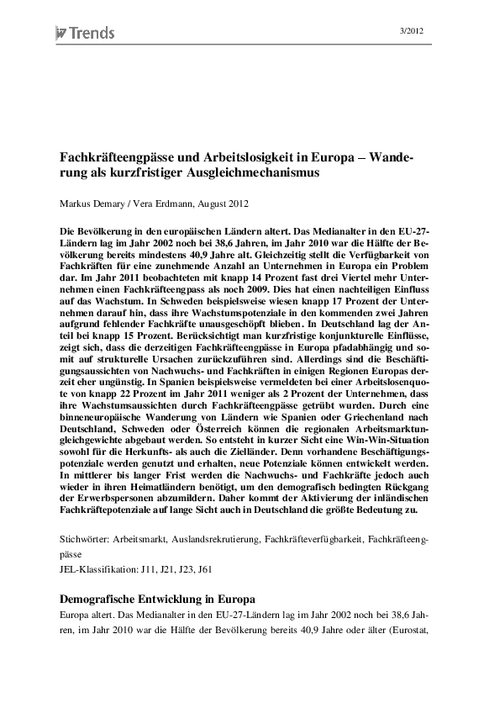Migration as a Short-term Balancing Mechanism

Skills Shortages and Unemployment in Europe

Migration as a Short-term Balancing Mechanism
The populations of the European nations are ageing. In 2012 the median age in the 27 EU countries was still 38.6 years. By 2010 half the population was already at least 40.9 years old. In 2011, roughly 14 per cent of companies perceived a bottleneck in the supply of skilled workers – an increase of almost three quarters over 2009. This development has a negative influence on growth. In Sweden, for example, almost 17 per cent of companies indicated that their growth potential will not be fully exploited in the next two years due to the lack of skilled workers. The equivalent proportion in Germany was nearly 15 per cent. If we take the short term influence of the business cycle into account, it can be seen that the current skills shortages in Europe are path-dependent and thus structural in origin. However, in some regions of Europe the employment prospects of the newly trained and other skilled workers are relatively poor. For instance, in Spain, where in 2011 unemployment was running at almost 22 per cent, less than 2 per cent of companies reported growth prospects dimmed by skills shortages. Inner-European migration from countries like Spain or Greece to Germany, Sweden or Austria is a potential means of reducing the imbalances in regional labour markets. In the short run, this creates a win-win situation for both the labour-exporting and labour-importing countries. This is because currently available employment potential can be exploited and thus preserved, while new potential can be developed. In the medium to long term, however, this new generation of skilled workers will be needed back in their homelands to mitigate the shrinking of the labour force due to demographic change. In the long term, therefore, activating the domestic skills potential will have to be given the highest priority.
Download | PDF

Skills Shortages and Unemployment in Europe

More on the topic

Determinants of personnel planning in Germany
The German labor market has been growing since 2005. The dip in the wake of the coronavirus pandemic between 2020 and 2022 is an exception, as the German labor market has reached a record level of 45.9 million people in employment by 2023.
IW
What factors influence the career ambitions of people with disabilities?
Many companies in Germany report having difficulties not only in recruiting employees, but also in filling vacant management positions.
IW